Entered into the database on Saturday, May 20th, 2006 @ 19:07:50 MST
Nepal's new government declared a public holiday after parliament passed
a proclamation stripping King Gyanendra of his powers and thousands of people
staged a celebration rally. Shouting "Long live the Nepali People" and Down with the monarchy,"
around 3,000 people marched through the streets of the capital Kathmandu and
converged on a park, witnesses said. "We will fight for the rights of people and not for power," N.P.
Saud, a lawmaker belonging to the Nepali Congress (Democratic) told the crowd. Home Ministry spokesman Baman Prasad Neupane said the nationwide public holiday
was announced "to celebrate yesterday's historic proclamation that made
the house of representatives sovereign and all-powerful." In the unanimously passed proclamation, the government stripped King Gyanendra
of political power and removed his control of the army. The proclamation also declared Nepal a secular state, ending its unique status
as the world's last Hindu kingdom. Under other provisions, the government will choose the successor to the throne
-- a step aimed at the hugely unpopular Crown Prince Paras whose playboy reputation
has made him a butt of public criticism. The royal family will also have to pay tax on properties and income. Newspapers splashed stories about the proclamation on front pages, describing
it as "momentous" and "glorious." "A Nepali Magna Carta is born," a headline in the Kathmandu Post
declared. "This historic day vindicates that the people power reigns supreme,"
said an editorial in the Kathmandu Post, an English-language daily. Thursday's decision effectively ended the power of King Gyanendra's 250-year-old
Shah dynasty and marked a turning point in Nepali history, the Himalayan Times
said in an editorial. "With it (the proclamation) comes an end to the Shah dynasty as the custodian
of the nation's sovereign power and the centuries of legacy it has embodied,"
the editorial said. Residents of the capital welcomed the proclamation and called for the monarch
to take a back seat. "I really respect the politicians and the political parties for this landmark
decision. It's a victory of the people over dictatorship," said Ramesh
Khadka, a 30-year old taxi driver. "The king should be ready to accept the ceremonial position like the monarchs
of Japan and Britain, otherwise the people can remove him and establish republic
in the country," he said. Gyanendra was forced by mass protests to relinquish absolute rule last month
and restore parliament after seizing power in February 2005 in what he said
was a bid to quell a deadly Maoist insurgency. Since his downfall, the government and Maoists have called a ceasefire and
parliament has agreed to a rebel demand to hold elections for a special body
that will rewrite the constitution and formally curtail the king's power. Preparations for peace talks are well underway to end the decade-long Maoist
insurgency that has claimed at least 12,500, and talks will take place soon,
the government has said, although a date for talks has yet to be announced.
After fighting for a communist republic since 1996, the Maoists now say they
are willing to rejoin mainstream politics and accept multi-party democracy.
However, they need to stop all forms of violence before being allowed to join
the interim governemnt, Nepal's deputy prime minister said Friday. "We want to end all possibility of armed conflict in the future and we
want to being them (the Maoists) into the interim government and into peceful
democratic politics, not with arms and not with violence. It should be abandoned
and it should be guaranteed," KP Sharma Oli Nepal's deputy prime minister
and foreign minister told reporters and diplomats Friday. The ball was in the politicians' court to resolve the insurgency, said Mohan
Shrestha, a grocer in the city centre. "King Gyanendra's takeover went against the aspirations of the people.
The parties were compelled to take this bold step to counter the king's absolute
rule," he said. "Now, the parties should move ahead towards resolving the Maoist problem."
